Update on Queensland fruit fly outbreak in Como and surrounding suburbs
The Quarantine Area established to help contain a Queensland fruit fly (Qfly) outbreak in the Como area has been extended to include Curtin University and part of Bentley.
The Quarantine Area was first declared on 5 May 2018 following the detection of 16 Qfly over 14 days. According to the Australian Fruit Fly Code of Practice, the Department of Primary Industries and Regional Development (DPIRD) commenced an eradication program, including establishment of a Quarantine Area (1.5km radius from detections) and Outbreak Zone (200m radius from detections).
Extension of the Quarantine Area was triggered by an additional three adult male Qfly caught in traps on the perimeter of the current Outbreak Zone on 14 May 2018. The Quarantine Area now includes all or parts of Bentley, Como, Kensington, Karawara and South Perth. In this area there are restrictions on the movement and disposal of home-grown fruit and vegetables (outlined below).
To date, an additional 51 Qfly traps have been placed in the Outbreak Zone, which are being checked twice a week. DPIRD’s existing traps within the Quarantine Area are also being checked twice weekly.
More than 900 properties in the Outbreak Zone have been visited, with some 600 property owners successfully contacted to identify host trees and gain access for baiting. Baiting of host trees and plants, including street trees, will be undertaken on a weekly basis until at least November (subject to more Qfly being detected).
Residents will be notified when the eradication program closes and the Quarantine Area is lifted.
All properties visited are being left a contact card to arrange a return visit if not home. DPIRD will request if you want to be present during baiting activities. DPIRD officers and support staff are clearly identifiable by uniform and are carrying photo identification.
Critical to a successful eradication program will be community awareness of the Quarantine Area rules. DPIRD has welcomed the support of the City of South Perth, Town of Victoria Park and Curtin University in helping to distribute information throughout the affected suburbs.
See DPIRD’s website for more information and a current map of the Quarantine Area and Outbreak Zones.
What can you do to help?
Qfly is a destructive fruit pest that is not present in Western Australia. It is more destructive and has a larger host range than the already present Mediterranean fruit fly.
Because we are free of Qfly, Western Australia can sell fruit and vegetables into premium overseas and interstate markets. Your support is needed to help contain the current outbreak, and prevent spread to other areas.
Our goal is to remove all pathways through which Qfly can spread to other areas, and this will involve your cooperation.
Specifically:
- DPIRD need access to private properties to carry out weekly baiting activities, and are attempting to contact all occupiers of properties within the Outbreak Zone. If you receive a calling card, please call to make an appointment. DPIRD appreciate the inconvenience of having to arrange and accommodate repeated property visits. We thank you in advance for your patience.
- Anyone living or working within the Quarantine Area must not move home-grown fruit and vegetables such as tomatoes, chillies, eggplants or capsicums to locations outside of the Quarantine Area (unless, cooked, preserved, frozen or solarised according to strict disposal guidelines, or formally approved by DPIRD).
- Anyone living in the area or businesses/schools with fruit trees on their property must dispose of fallen or ripening fruit and vegetables every three days – according to disposal guidelines.
- Quarantine rules apply to the picking of fruit and vegetables from publicly accessible properties such as community gardens, schools, parks, verges, Curtin University and the Perth Zoo. This includes olive trees on streets and in parks.
- University students renting in the area have an obligation to dispose of fallen and ripening fruit in their backyards. If you are in the Outbreak Zone, DPIRD is happy to help collect and dispose of backyard fruit. Residents in these areas should have received details on how to contact the department to arrange a property visit.
- There is an excess of citrus this time year, and many online traders advertising fruit such as lemons and limes. If located within the Quarantine Area, traders must cease selling or trading host fruit and vegetables. See our website for a list of Qfly hosts.
- Home gardeners and gardening contractors must ensure that green waste is stripped of fruit and vegetables prior to disposal. Fruit must then be disposed of according to disposal guidelines.
- Residents should check their fruit for any fruit fly activity – in particular larvae in unexpected fruit and vegetables. Qfly are most often seen on the undersides of leaves or on maturing fruit. Adult Qfly are slightly bigger than the already present Mediterranean fruit fly (Medfly), and have clear wings (Medfly wings are mottled). However Qfly can be easily mistaken for Medfly, so report any fruit fly or larvae seen to DPIRD.Information for industry Western Australia’s Area Freedom for Qfly, which underpins market access for a range of produce remains in place.
Disposal guidelines
The Quarantine Area Notice stipulates that ripening and fallen fruit must be disposed of every three days. Regular removal means that fruit fly will be unable to lay eggs and start the breeding cycle. Disposing of fruit and vegetables according to the guidelines below will kill any eggs or larvae.
Where fruit on your tree is inaccessible, wait until it has fallen to the ground and then dispose of accordingly.
Disposal options include:
- Eating or cooking (boil or microwave)
- Freezing (minimum 24 hours)
- Solarising - place in a sealed, heavy-duty black plastic bag which is placed in direct sunlight for three days
- Soaking - place in a bucket or large container of water with a film of white oil for at least seven days
- Burying to a depth of at least 1 metre. Qfly adults can emerge from under the soil surface if not buried deep enough
- Do not give away any home-grown fruit or vegetables.
Only after cooking, solarising or freezing can you:
- Feed it to poultry
- Compost it
- Put in the rubbish.
Making traps and bait at home
The community can also participate by making a fruit fly trap. Making a trap is an easy and cost effective way of managing fruit flies on your property. You can also purchase a safe and organic foliar bait mixture to spray on your trees and prevent infestation.
Refer to this flyer and video on managing Mediterranean fruit fly (also applicable to Qfly).
About Qfly
Qfly is considered a more serious pest than the already present Mediterranean fruit fly. More information on Qfly can be found on DPIRD’s website.
Reporting options
Qfly is bigger than Medfly, with clear wings. Medfly has mottled wings. However, Qfly can be easily mistaken for Medfly, so please report any signs of fruit fly.
• Call 9368 3080.
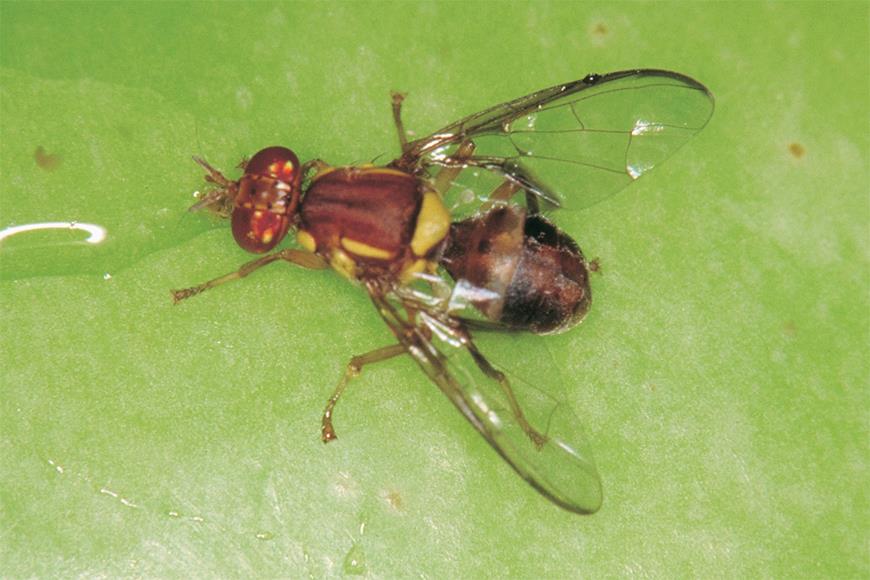
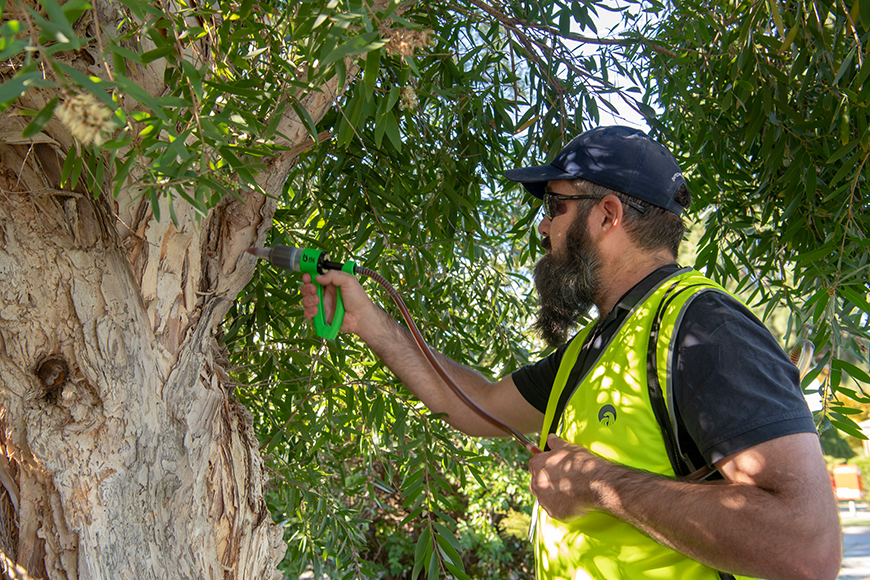
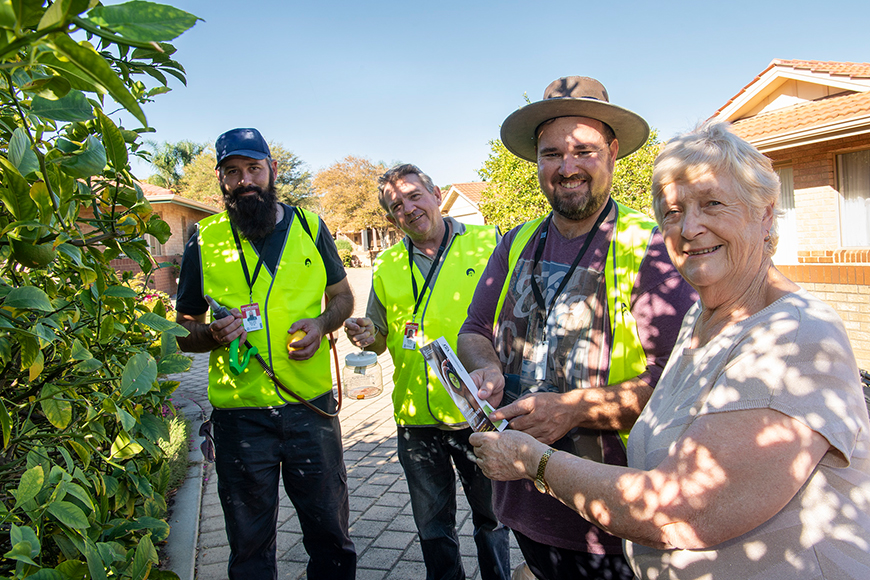
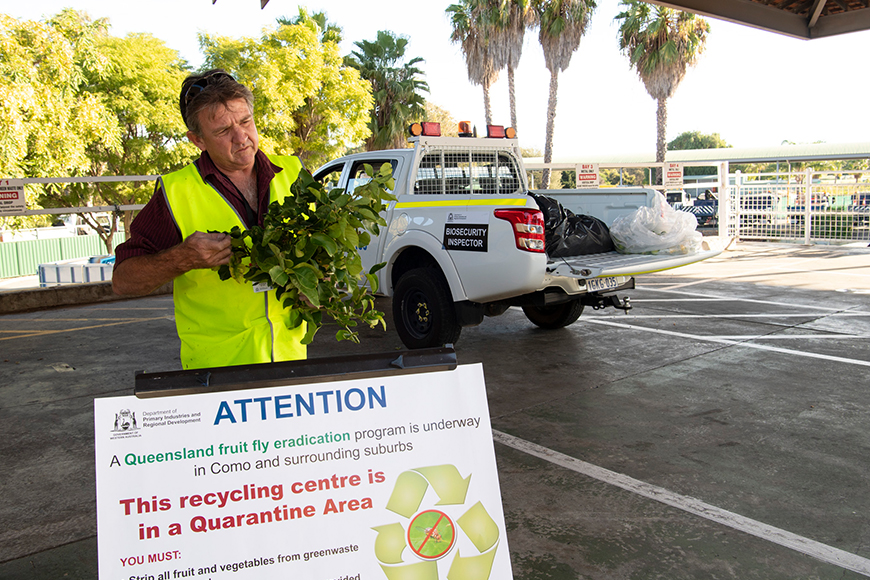
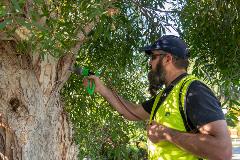
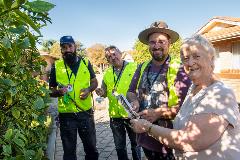
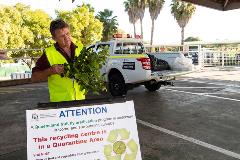
Department of Primary Industries and Regional Development
- Phone 9368 3333
- Email enquiries@agric.wa.gov.au

